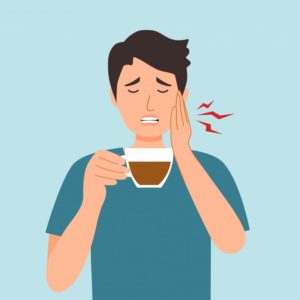
There’s nothing scarier than a cup of hot chocolate or a bowl of ice cream, right? If that sounds crazy, you probably are fortunate enough to not be struggling with tooth sensitivity in Chevy Chase. But why do hot or cold foods and drinks make some people’s teeth hurt? Read on to find out why from your dentist and solutions to reduce the pain.
The Pain Can Be Explained
To understand why hot and cold foods cause tooth pain, it’s important to first understand the structure of teeth. They are alive with nerve endings and sensitive tissues inside them, just like the rest of your body. However, your teeth are protected by a layer of enamel which is a nonliving material.
Tooth enamel can be worn away as bacteria multiply, feeding on sugars and starches left over on teeth after you eat and drink. As the bacteria multiply, they produce acids that dissolve tooth enamel.
Tooth enamel can’t heal itself like other parts of your body. However, it can be reinforced by compounds that bind to it, like fluoride. This is why brushing your teeth twice a day with fluoride toothpaste is essential for keeping your teeth strong and healthy.
Hot and cold foods make your teeth hurt because your enamel has weakened, and the underlying structures of your teeth are exposed. Dentin lies beneath the enamel, and this material is less dense and tough than enamel. However, dentin is also a living structure capable of repairing itself if the damage is not too widespread.
Plus, dentin contains small tubules that connect to the nerves deep within teeth. So, when the dentin is exposed to hot and cold temperatures, it stimulates nerve activity which creates a painful sensation.
What Are Other Reasons Hot & Cold Foods Make My Teeth Hurt?
There are other potential culprits beyond your enamel weakening and dentin getting exposed, such as:
- Receding gums: When gums start to pull away from the teeth, usually due to bacterial damage, it exposes the dentin. When hot and cold foods touch these exposed parts of teeth, it will cause pain.
- Cavity: The same process that wears away tooth enamel also creates cavities. Bacteria tend to sink into valleys and hard-to-reach places on teeth. The acids they produce collect here and form small holes in teeth. As these holes get deeper, more of the tooth becomes exposed and the tooth will be sensitive to hot and cold temperatures.
- Damaged tooth: Similar to a cavity, if a tooth is cracked, chipped, or otherwise damaged, the dentin or even the dental pulp will become exposed. This can cause intense pain.
- Teeth grinding: Also called bruxism, this usually happens at night and a person doesn’t notice it until they wake up. The force of teeth grinding puts too much pressure on teeth and will cause the gums to pull away. This exposes the tooth’s structures and creates sensitivity to heat and cold.
- Teeth bleaching: Enamel is mostly transparent and doesn’t actually color your teeth. Dentin gives your teeth color, and teeth bleaching products have to wear away enamel to whiten teeth. This, in turn, can cause tooth sensitivity.
- Hard brushing: brushing your teeth too hard can also wear away enamel. Like teeth grinding, a person often doesn’t notice they are doing this. When you brush your teeth, take a moment to notice the pressure you’re using.
How Can I Reduce the Pain from Tooth Sensitivity?
First, if you notice your teeth are cracked, or loose, or your gums are swollen, red, and pulling away, see a dentist. Or, if you realize you are waking up with a sore jaw and suspect you’re grinding your teeth at night, a mouthguard might be helpful. This can help to protect the exposed tooth and resolve the pain from hot and cold foods.
However, if you’re experiencing tooth sensitivity from weakening enamel, it can be harder to find relief. Here are a few solutions:
- Sensitive toothpaste or mouthwash: Toothpaste or mouthwash made for sensitive teeth contains special ingredients that fill the tubules within the dentin, reducing nerve activity from hot and cold temperatures.
- Soft-bristled toothbrush: If the enamel around your teeth is already weakened, a soft-bristled toothbrush can help to scrub away bacteria without damaging enamel.
- Bonding gel: If a larger part of a tooth’s surface becomes exposed, your dentist can apply a bonding gel over the area that will cover it. This can sometimes be used to repair small defects in teeth or reinforce weakened areas.
If hot and cold foods make your teeth hurt and you’re having trouble enjoying your favorite meals, your dentist can find the cause of your tooth sensitivity and help you resolve the problem. Schedule an appointment today with your dentist in Chevy Chase to make foods and beverages enjoyable once again!
About the Author
Dr. Annie Yu has been working hard for the smiles of her patients for more than 15 years. She earned her dental doctorate from The Ohio State University and went on to study at prestigious institutions like the Dawson Academy and the Pankey Institute. Dr. Yu was awarded her Fellowship in the Academy of General Dentistry (FAGD) in 2013 and then a Mastership (MAGD) in 2020 which is a designation less than 2 percent of all general dentists have obtained. If you need help getting tooth sensitivity under control, schedule an appointment on her website or call (240) 743-4421.
